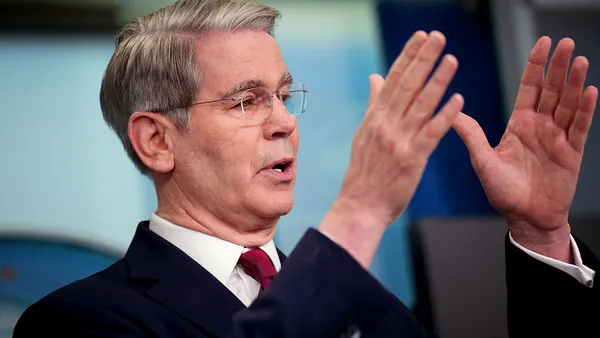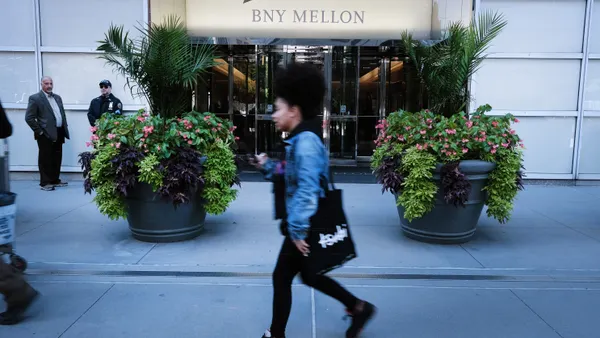Dive Brief:
-
Truist, Fifth Third, PNC and KeyBank became the latest sizable U.S. banks Thursday to place restrictions on branch access in the wake of the coronavirus outbreak.
-
Citi and Wells Fargo have proposed behavior modifications for remote workers to keep teleconferencing systems from being overwhelmed.
-
The restrictions follow the lead of JPMorgan Chase, which on Wednesday became the first systemically important U.S. bank to announce it was temporarily closing 20% of its branches and reducing open hours at others. Capital One on Monday also said it would close 120 branches.
Dive Insight:
Thursday’s announcements also follow a pair of regional banks — Birmingham, Alabama-based Regions Bank and Columbus, Ohio-based Huntington Bank — which both rolled out temporary policies late Wednesday. Huntington, meanwhile, closed its locations within retailers and those without drive-through windows, effective Thursday.
"We were having several dozen people in our branch lobbies, and we couldn’t control it," Huntington Chief Executive Stephen Steinour told The Wall Street Journal. "We had customers say they didn’t feel safe with that kind of crowd."
Regions, effective Thursday, restricted access to branch lobbies to customers with appointments. Others would be directed to the drive-through.
Similarly, KeyBank, effective Thursday, began steering branch customers to do business via drive-through and limited lobby access to appointments.
"Our primary focus is protecting our clients, employees, and communities, and this decision was not made lightly. These changes will be in place indefinitely," the Cleveland-based lender said Thursday in a statement. "However we will review our branch operations on a regular basis and adjust our plan accordingly. We will continue to follow the advice of the [Centers for Disease Control and Prevention], state, and local authorities for best health practices in our branches and offices."
The bank also previewed a short-term temporary assistance loan, set to launch next week, which will feature same-day approval, next-day funding and low interest, though KeyBank did not provide specific terms.
Pittsburgh-based PNC said it would temporarily close about a quarter of its 2,400 branches, effective Friday, operating the rest "primarily in a drive-up only mode, augmented with select branches that do not provide drive-up capability."
"The challenges all of us face at this time are unprecedented, and PNC is making these adjustments to help keep our customers and employees safe," Bill Demchak, PNC’s chairman, president and CEO, said in a statement Thursday. "Great consideration went into these decisions and we are confident in our ability to seamlessly deliver through these changes with minimal disruption at the level of service our customers expect and deserve."
Cincinnati-based Fifth Third is restricting lobby access at branches to appointments only, effective Saturday, and further limiting open hours.
"While we have to temporarily adapt our banking experience to keep our customers and employees safe, we are working to ensure it remains as easy and convenient as possible to do business with us," Greg Carmichael, the bank’s chairman, president and CEO, said Thursday in a statement.
Charlotte, North Carolina-based Truist likewise is closing lobbies in most of its 2,800 locations except by appointment, effective Saturday, emphasizing its drive-through option. However, "some branches without drive-thru lanes that serve a critical community need will remain open, but with regular enhanced cleaning and sanitization protocols," the bank added.
Truist on Tuesday announced it is donating $25 million to cover basic needs, medical supplies and financial hardship related to the coronavirus outbreak. The bank also said it is giving employees 10 days of paid leave to help deal with school closings and other disruptions, and is reimbursing some workers for child-care costs and boosting emergency child and elder care benefits for all employees, according to the Charlotte Observer.
A pair of big banks are suggesting modifications so companywide systems don’t fail amid the swell of remote work. Citigroup asked its non-essential workers in North America to delay logging into its remote access system until 1 p.m. Thursday so they wouldn’t be logged in at the same time as Europe-based workers, Reuters reported.
Meanwhile, teams at Wells Fargo have been asked to stagger the start times of conference calls — to off times such as 20 minutes after the hour, for example — so that not everyone clogs the teleconferencing system at the top and bottom of the hour, according to a memo seen by Reuters.













